There is so much learning that we all pick up from our normal lives, activities and environments, every day, without even trying. Some call learning from the world, worldschooling or world schooling. You can call it that if you like. Some prefer natural learning, unschooling or wildschooling. It’s part of being human, and certainly part of being a child, to learn.
It’s actually really hard to stop learning from happening. Any environment or experience teaches us things. But can that learning replace a formal, government-stamped education? We think it can and that it goes even further towards producing well-rounded, globally aware, human beings than the school environment.
Our family is in the amazing position of being able to change our environment just about any time we like, drastically. We change continents like other people change mobile phones (socks would be a bit of an over-exaggeration!) so our flow of naturally provided learning resources never ends.
I get that not everyone can travel as freely as we do, but even if you’re tied to a town, a job, or a family, there are amazing things to be learnt all around you. The world is the best teacher.
It’s only really when we start to shoulder the responsibility of educating our own children and do a little research, maybe read the curriculum and understand the normal learning progression, that we start to notice the learning in the world all around us.
In a perfect world, no child would have to learn from books, they could get their education at source, leaving classroom restrictions behind. It would be lovely, but it’s not going to happen for many children just yet.
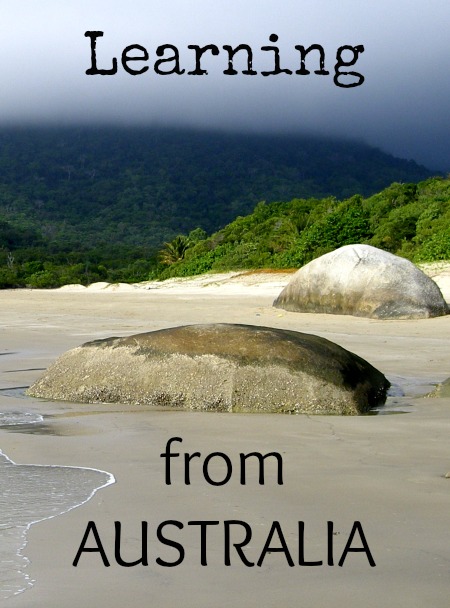
A very few of us feel we can, or even want to, educate our own kids. Fewer still do what my family does, we set off with our backpacks to find the learning in the world, all of the world.
My children spent almost 7 years in Australia, my eldest went to school briefly before we voted with our feet and started the homeschooling journey that changed our lives. My younger child, now 9, has never been to school, both were maybe unschooled, maybe homeschooled, with a little structured learning on the side. We tend not to like strict definitions, we just do home education our way. It’s important to do what works so we throw the rules out of the window.
Learning from Australia has been a valuable part of my boys’ education and they picked up a lot. Here are a few examples of how and where the learning happened, mostly just from living our lives.
Table of Contents
10 Things We Learnt Worldschooling Australia
Worldschooling Tropical Climate in Australia
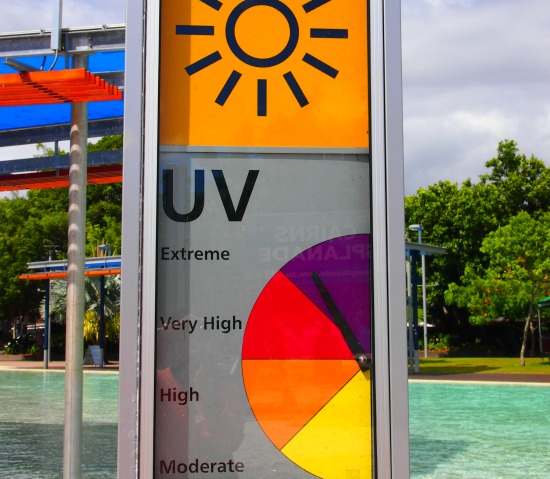
We lived just 16 degrees south of the equator. They quickly picked up on what the equator is and why we were so exposed to the sun all year round. Our local pool had huge signs stating the current UV level and temperature. We were ultra sun-smart.
The Water Cycle
As the wet season approached we would watch the clouds building over the Coral Sea and observe the water cycle playing out right before our eyes. Tropical downpours soaked us as those water saturated clouds rose over the mountains. Later the flood waters returned to the sea and puddles evaporated. It was textbook perfect!
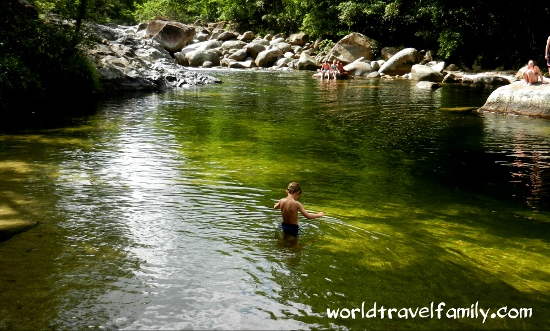
Tropical cyclones came and went, we were never hit, but we’d watch the charts as the storms built and swirled off to other unlucky towns.
We got a bit mixed up with the concept of 4 seasons, because really, we only had 2, the dry and the wet.
D asked me once what autumn was and of course, they never saw snow. But we’ve put that right in frozen Canada and wintry Romania. Right now they’re watching the leaves change and the conkers ripen in London. It’s wonderful that they’ve got such a handle on global climates and seasons already.
The Rainforest Environment
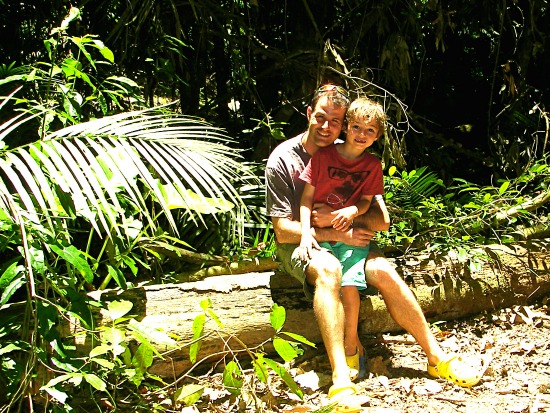
We had the Daintree Rainforest just up the road and a small pocket of Aboriginal owned rainforest at Mossman Gorge held our summer swimming hole. They understood that the cold water came straight from the top of the mountain and that the crocodiles, being reptiles, really didn’t like water that cold.
They are totally familiar with the layers of the rainforest and the creatures that inhabited them. They know how important birds are to the rainforest as seed dispersers and they know why tropical plants often have huge leaves and buttress roots.
We spent a long weekend staying IN the rainforest at Chambers Rainforest Lodge, near Cairns. Being on site gave us the chance to wake with the birds, feed wallabies at first and last light and observe nocturnal creatures like the tiny sugar gliders. Every day we would walk through the understory in the reduced light of the canopy high above.
World Schooling Australian Aboriginal Culture and Heritage
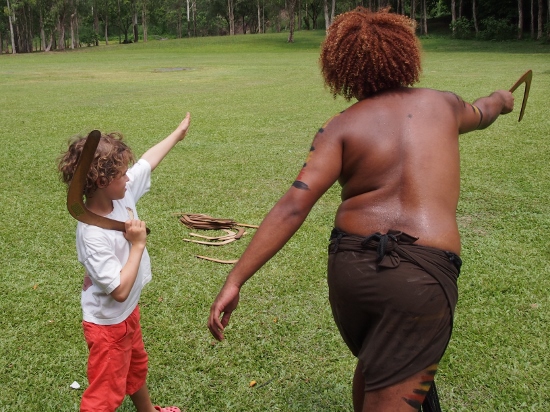
The kids have visited the Laura Aboriginal Dance Festival, a stunning three days of camping deep in the bush. They’ve seen ancient cave art and learned how to do a traditional leg wobble dance.
At Tjapukai, near Cairns, we enjoyed demonstrations of bush tucker, healing and weapons and they’ve thrown spears and boomerangs. They’ve both tried and failed to play the didgeridoo but they know which creature the rainbow serpent legends were based on, they’ve even held one.
In later years they visited Katherine Gorge and heard the rainbow serpent stories around this location. World schooling in Australia offers unique learning experiences.
Marsupials
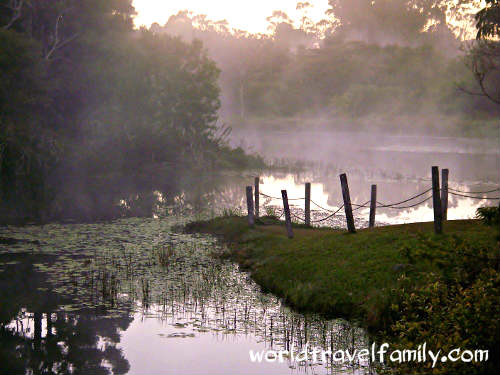
Marsupials are wonderful things. Does everyone know that they’re mammals? Do you know what a monotreme is, have you ever seen one? These unique Australian animals are a great opportunity for homeschooling some Biology Downunder.
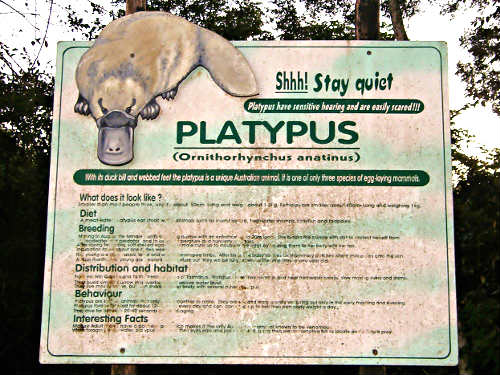
Aussie Beaches and The Rock Cycle
We observed as the rocks and shells crumbled to sand. Different beaches in our areas gave us sand and various stages of weathering. The larger grains were easily identifiable as shell or rock.
We walked the shore line and the intertidal zone, noticing the creatures that live there. It’s a specialised environment, the intense heat made evaporation and increasing salinity in rock pools very visually obvious.
World Schooling Diseases, Parasites and the Immune Response in Australia
We’ve had our fair share of tropical bugs and illnesses in Australia and these may be used in world schooling.
Mosquito born diseases like Dengue fever, bacterial infections like school sores, even intestinal parasites, they all seem to love the tropics.
Doctor’s visits and treatment give further depth to the childrens’ knowledge of pathology and the amazing human immune system.
World Schooling What Australia is Like
Australia is different to all other countries. It’s not like the UK with hotter weather, it’s culturally unique, as are all countries. The people are different, their customs, values, speech, and even their diet is different.
The boys now know what it is to be Australian and live in Australia. Had we not lived there we’d know nothing, or very little, of Anzac day, Australia day, Aussie rules football, Halloween (it’s much bigger Downunder than in the UK), Ned Kelly, Captain Cook, Aboriginal history and “big” things.
Experiencing Australian culture and society is absolutely part of Aussie world schooling, but for the best educational value, the kids should be able to compare and contrast Aussie culture with that from as many other cultures as possiblr.
World Schooling Australian History
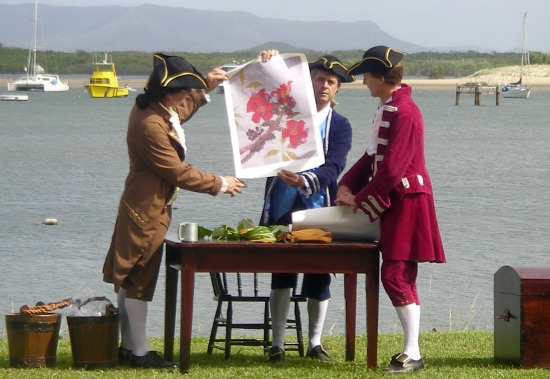
So much of Australian History can be learned from world schooling in Australia.
Captain Cook. The European explorer looked down on us every time we drove to Cairns. We visited his ship, we went to Cooktown to see where he repaired her and we watched the re-enactment of the first contact between his crew and the local Aboriginal people.
We visited Herberton Historic Village to see what life was like in the olden days in Australia, along with dozens of other similar attractions.
World Schooling Conservation and Environmental Care in Australia
We saw first-hand how litter ends up in our seas through our work as volunteers with Tangaroa Blue beach cleanups in Australia. Later, in Sri Lanka, we saw turtles unable to submerge because of ingested plastic, it was nice to tie the experiences together, all be it in a different country.
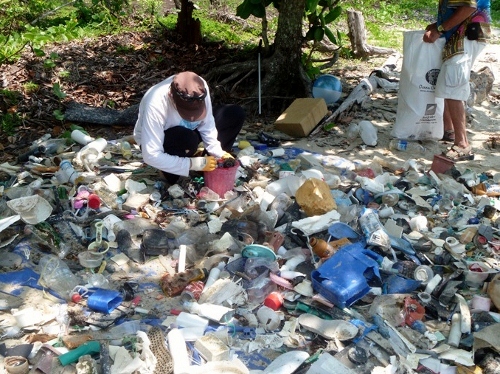
We saw wild cassowaries and learnt how important they are to the rainforest and how important the rainforest is to them.
We visited the Great Barrier Reef often and absorbed every piece of information the marine biologist shared with us. We also saw with our own eyes the damaged and healthy parts of the reef.
Growing and Catching Their Own Food
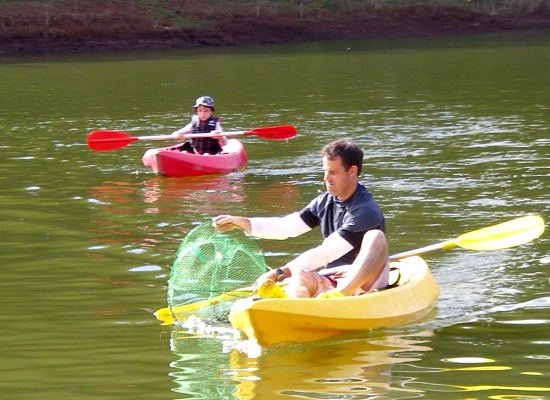
We were gardeners in the tropics, we struggled with heavy clay soil to make it productive, but once we got going we grew tropical and Mediterranean fruits and vegetables with varying success. We saw that some plants did better in a tropical climate and soil than others.
I had to adapt the way I gardened to the conditions, I learnt as much as the kids. The kids know which food plants grow in the tropics and how to grow them. They compared and contrasted the crops grown in Australia with those grown in dozens of other countries.
We caught our own fish and yabbies in Australia, and gathered wild mangoes in season. We thought about collecting shellfish to eat, but in the end it was too risky.
Local Australian Agriculture and Industry
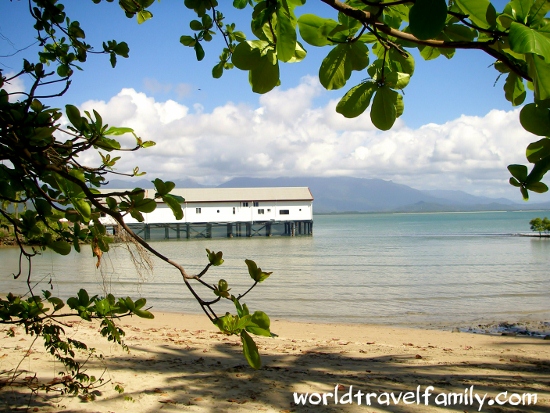
Sugar is king in Far North Queensland, we watched the cane grow, flower, sometimes be flattened by storms and the eventual harvest and transportation to the sugar mill. Every year the same cycle.
Sometimes a distant plume of smoke would alert us to a cane fire. We’d jump in the car, often gathering a few of the neighbours’ children, to go and watch the spectacle. They understand the hows and whys of the process. Do you?
The sugar was shipped out of Port Douglas from the old sugar wharf located on our Inlet, away from the sea. That is the origin of the tourist town we lived in. The growth of the town and jobs in tourism brought other needed trades, a resident population needs doctors, electricians and plumbers. These newcomers needed houses and the town spread, more resources were needed so transport connections improved. All this was there for us to see.
That is how it goes, how the learning happens. It’s sometimes called world schooling, learning from the world.
On our journey of over 50 countries we’ve been able to compare and contrast. Some countries had similar climates and similar crops, others vastly different. In Guatemala we saw a sub-tropical rainforest, immediately different to the boys’ trained eyes.
We love our way of learning, we think it’s cool. I remember studying most of these things in textbooks but I believe our way is better. World schooling in Australia has a lot to offer and this sort of learning can easily be incorporated into homeschooling. What do you think? Why not read our post about making friends for homeschoolers?
Jacqui Malpass says
What a fab story, I’d want to be schooled by you too. What a glorious way to encounter learning.
Thursday says
What a wonderful exploration of far nth Qld, unschooling and experiential learning. Your passion is inspirational! Brilliant!
Talitha says
I believe you are absolutely right ! No child so learn exclusively out of text-books …
How did it come so far ?
And just, very anecdotically, our son learned to play the Didgeridoo in Hall’s Gap, he got away with circular breathing almost immediately and still plays the Didg!
Talitha
Alyson Long says
Now playing the digeridoo is something I’d love them to try, maybe this time in Australia they’ll want to. To learn anything you need to want to. I actually haven’t read this post in maybe 4 years…off for a read and an edit!